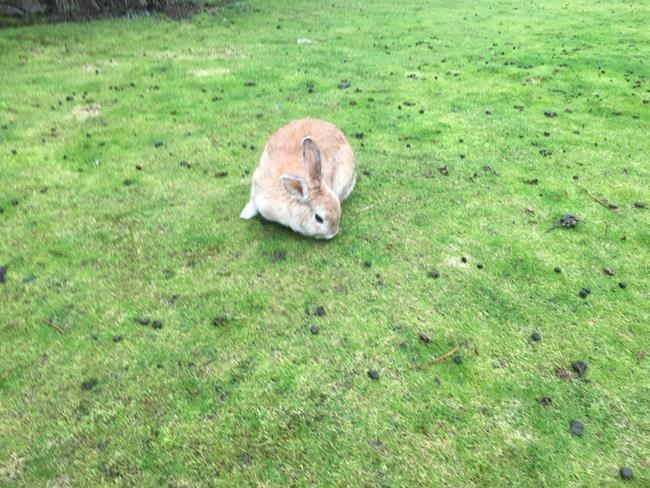
A wild rabbit grazes in Nanaimo, B.C. in this Feb.2, 2018 photo. A rare disease making its first appearance in British Columbia is killing feral rabbits and it's prompted a warning from the provincial government that pet owners should keep their domestic rabbits out of the wild. THE CANADIAN PRESS/Dirk Meissner
Republished March 06, 2018 - 3:45 PM
Original Publication Date March 06, 2018 - 1:16 PM
VICTORIA - Hundreds of feral rabbits in a Vancouver Island community are falling victim to a rare disease that prompted the government to warn people against releasing their long-eared pets into the wild.
British Columbia government veterinarians have confirmed that feral rabbits in Nanaimo are dying from an outbreak of rabbit haemorrhagic disease, a calicivirus that includes a fever, convulsions and kills a rabbit within 36 hours.
Wildlife veterinarian Helen Schwantje said Tuesday the highly infectious and deadly rabbit virus is making its first confirmed appearance in B.C. and third in Canada.
She estimated more than 300 rabbits have died in recent weeks, with most deaths recorded near or at the Nanaimo campus of Vancouver Island University.
"As far as we know, it hasn't spread to any other locations on the Island or off the Island," Schwantje said.
The government issued its warning last week after three rabbits sent to the Animal Health Centre in Abbotsford were determined to have died of the disease, which is exclusive to rabbits and does not affect cats, dogs, horses, other pets or humans.
"It basically causes a massive failure of the circulatory system," said Schwantje. "It causes massive kidney damage and massive hemorrhaging in many organs."
She said the cause of the outbreak has not been determined, but it likely came from an infected domestic rabbit released at or near the Nanaimo campus.
"It's very possible somebody had a domestic rabbit and released it and that rabbit carried the virus and could have seeded it through the population on the campus," Schwantje said. "As you know, people release their rabbits thinking that they're doing them a favour, whereas in actual fact, they are not."
She said there are documented cases of governments in Australia and New Zealand purposely introducing the virus to eliminate feral rabbit populations in some areas.
The outbreak has city officials in Nanaimo removing dozens of rabbit carcasses from the campus and other nearby areas, said Karen Fry, the city's director of public safety.
"We've been told today from my animal control centre that there are also large swarms of eagles and hawks," she said. "We get reports of dead rabbits and there's nothing there, but there are a lot of birds."
Fry said the rabbits at the university campus have always been a matter of debate by people who enjoy their presence and others who consider them a nuisance. But their deaths have upset many people.
"It's sad," said Fry. "You never want to see any animal suffer."
Leah Moore, who operates the Flying Fur Animal Rescue and Refuge in nearby Parksville, said she's moved the facility's 24 rabbits indoors until the outbreak subsides.
She is not admitting any new rabbits or offering any for adoption.
"But if there's an injured bunny out there, we'll help," said Moore.
Schwantje said the outbreak could have spread beyond Nanaimo if it happened during the summer because insects can transmit the virus to rabbits.
Owners of domestic rabbits should keep their pet areas clean, she said.
News from © The Canadian Press, 2018